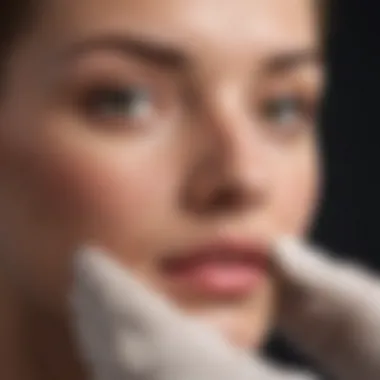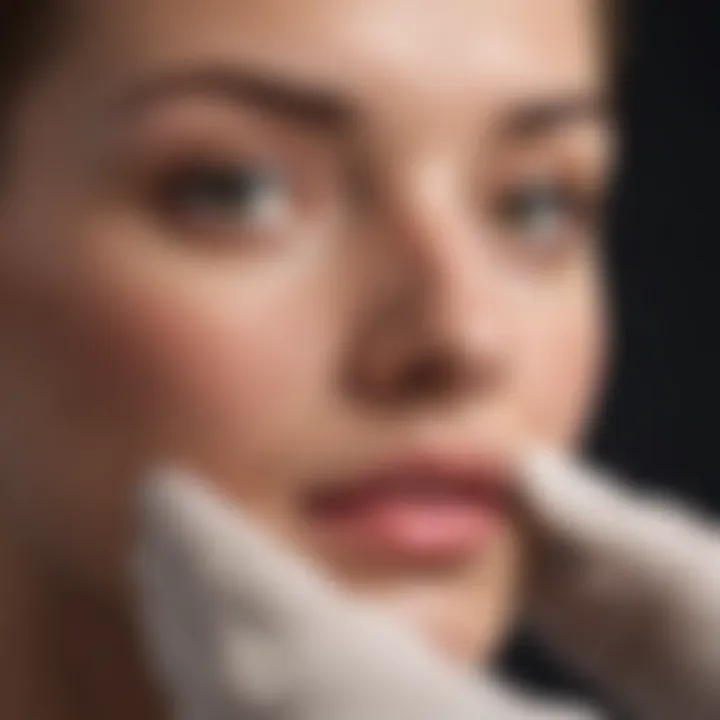Effective Strategies for Managing a Big Pimple and Achieving Clearer Skin


Trendy Haircut Trends
In this section, we delve into the realm of trendy haircut trends. Discover the latest haircut styles for men that are making waves in the fashion scene. From classic fades to modern undercuts, we provide detailed descriptions of each style and how to achieve them effortlessly. Expert advice is offered on maintaining your trendy haircut, from product recommendations to styling techniques that ensure your hair stays on point at all times. Additionally, we curate a collection of trendy haircut inspirations sourced from celebrities and influencers, giving you a plethora of options to draw inspiration from and personalize your look to reflect your own unique style.
Men's Fashion Trends
Moving on to men's fashion trends, we highlight the current sartorial directions for men's clothing. Explore the latest styles, color palettes, and patterns that are dominating the fashion landscape. Moreover, we showcase must-have accessories that can elevate any outfit, from statement watches to stylish belts that add a touch of sophistication to your ensemble. Our step-by-step guides provide insight into creating stylish outfit combinations that exude confidence and flair, helping you elevate your fashion game effortlessly.
Style Tips and Tricks
In this section, we offer essential grooming tips for men looking to up their style ante. From skincare routines to hair care practices, we cover a range of grooming advice tailored to enhance your overall appearance and boost your confidence. Learn tips on mixing and matching different clothing pieces to create visually appealing outfits that reflect your personal style. Additionally, explore suggestions for seasonal style trends and outfit ideas that ensure you stay ahead of the fashion curve and make a statement with your fashion choices.
Trend Alerts
Lastly, we discuss trend alerts to keep you informed on how to dress for specific events and occasions with style and panache. Receive updates on new collections from popular fashion brands that are reshaping the fashion landscape and setting new trends. Dive into detailed analysis of celebrities' fashion choices and gain insights on how to replicate their looks while infusing your unique personality into your outfits. Stay ahead of the fashion curve with our trend alerts section, ensuring you always make a stylish statement wherever you go.
Understanding the Nature of a Big Pimple
A comprehensive understanding of the nature of a big pimple is crucial for anyone seeking clearer skin. Not merely a surface issue, a big pimple often signifies underlying factors that need attention. By delving into the causes and characteristics of big pimples, one can tailor their approach to effectively manage and prevent future breakouts. With nuanced insights into hormonal imbalances, clogged pores, bacterial infections, and genetic predispositions, individuals can adopt strategic measures for clearer, healthier skin.
Causes of Big Pimples
Hormonal Imbalances
Hormonal imbalances play a significant role in the development of big pimples. Fluctuations in hormone levels can trigger excessive sebum production, leading to clogged pores and inflammation. Understanding the interplay between hormones and the skin is essential for addressing pimple outbreaks effectively. While hormonal imbalances can be challenging to control, targeted skincare routines and professional interventions can help mitigate their impact.
Clogged Pores


Clogged pores are a common culprit behind big pimples. When sebum, dead skin cells, and bacteria accumulate in the pores, it creates an ideal environment for pimple formation. Proper cleansing and exfoliation are key to preventing pore blockages and reducing the risk of breakouts. By incorporating gentle cleansing techniques and exfoliating products, individuals can dislodge debris and maintain clear pores.
Bacterial Infections
Bacterial infections, particularly by Propionibacterium acnes, contribute to the inflammation and enlargement of pimples. These microbes thrive in the oil-rich environment of clogged pores, exacerbating skin irritation. Combating bacterial infections requires targeted treatments, such as antibacterial creams or oral medications, to eliminate the underlying cause of pimple formation.
Genetic Factors
Genetic factors also play a role in predisposing individuals to big pimples. Inherited traits impacting sebum production, skin sensitivity, and inflammation can increase the likelihood of developing stubborn pimples. While genetic factors may be beyond one's control, awareness of family history can guide personalized skincare regimens and treatment plans tailored to address specific vulnerabilities.
Characteristics of a Big Pimple
Inflammation
Inflammation is a hallmark characteristic of a big pimple, manifesting as redness, swelling, and warmth in the affected area. The body’s immune response to bacterial presence triggers this inflammatory cascade, leading to discomfort and visible skin changes. Managing inflammation through anti-inflammatory products and techniques can help alleviate symptoms and promote pimple healing.
Pain or Tenderness
Pain or tenderness often accompanies a big pimple, making it sensitive to touch and movement. Nerve endings in the skin respond to the pressure and swelling caused by the pimple, resulting in varying levels of discomfort. Practicing gentle skincare and avoiding harsh manipulation of the pimple can prevent further irritation and alleviate pain.
Enlarged Size
The enlarged size of a big pimple sets it apart from regular blemishes, making it more prominent and challenging to conceal. Factors like trapped sebum, deep inflammation, and bacterial proliferation contribute to the pimple's size and severity. Targeted treatments, such as spot treatments and acne patches, can help reduce the size of the pimple and promote faster healing.
Preventive Measures for Future Breakouts
When discussing the topic of Preventive Measures for Future Breakouts within the context of managing a big pimple, it is crucial to emphasize the significance these measures play in achieving clearer and healthier skin. By implementing preventive strategies, individuals can proactively address issues that may lead to breakouts, thus promoting long-term skin health and vitality. Preventive measures are not merely reactionary but serve as a proactive approach to skincare, aiming to address underlying causes and prevent future occurrences of big pimples. This section delves into various elements of preventive care, ranging from skincare routines to healthy lifestyle habits, underscoring their pivotal role in managing pimple breakouts effectively.


Maintaining a Consistent Skincare Routine
Gentle Cleansing
Gentle Cleansing stands out as a cornerstone in any skincare routine, especially when combatting big pimples. The gentle yet effective removal of impurities, dirt, and excess oil from the skin's surface aids in preventing pore blockages that can lead to eruptions. Choosing mild cleansers suited to individual skin types ensures a non-invasive cleansing process that preserves the skin's natural moisture barrier. Despite its simplicity, Gentle Cleansing significantly contributes to overall skin health by keeping pores clear and reducing the likelihood of pimple formation.
Moisturizing
Moisturizing holds immense importance in skincare, even for those dealing with big pimples. Proper hydration plays a crucial role in maintaining skin balance and preventing excessive dryness that can trigger increased sebum production. Selecting non-comedogenic moisturizers ensures adequate hydration without clogging pores, striking a delicate balance between moisture and oil control. By incorporating moisturizing into a daily routine, individuals can nurture their skin's health while mitigating factors that contribute to pimple development.
Regular Exfoliation
Regular Exfoliation serves as a vital aspect of skincare routines aimed at preventing future breakouts. This process involves the removal of dead skin cells, promoting cell turnover and avoiding congestion that can lead to pimples. Gentle exfoliants help unclog pores and refine skin texture, fostering a smoother complexion and reducing the likelihood of blemishes. While exfoliation aids in maintaining skin clarity, overdoing it can compromise the skin's barrier function, underscoring the importance of moderation in this skincare practice.
Dealing with a Big Pimple
Dealing with a big pimple is a crucial aspect of a skincare regimen aimed at achieving clearer skin. When confronted with a sizable blemish, knowing how to effectively address it can make a significant difference. By understanding the nature of big pimples and the factors contributing to their development, individuals can tailor their approach to tackle these pesky skin concerns. Implementing the right strategies for dealing with a big pimple can not only aid in reducing inflammation and discomfort but also prevent potential scarring. This section will delve into various treatment options and provide insights on managing big pimples effectively.
Topical Treatments
Spot Treatments
Spot treatments play a vital role in the targeted treatment of big pimples. By focusing on the affected area, spot treatments aim to reduce inflammation, redness, and overall size of the pimple. Their application allows for the direct delivery of active ingredients to the blemish, promoting faster healing and minimizing the risk of further complications. While spot treatments are not a one-size-fits-all solution, they are a popular choice for many individuals dealing with occasional breakouts. Understanding how to incorporate spot treatments into your skincare routine can significantly improve their efficacy and overall impact on managing big pimples.
Anti-Inflammatory Creams
Anti-inflammatory creams are formulated to address the swelling and soreness often associated with big pimples. Their key characteristic lies in their ability to soothe irritated skin while reducing redness and discomfort. By choosing an anti-inflammatory cream that suits your skin type, you can effectively combat the inflammatory response triggered by a significant pimple. However, it is essential to consider the potential side effects or adverse reactions that may arise from prolonged use of these creams, ensuring they are used judiciously for optimal results.


Sulfur-based Products
Sulfur-based products offer a natural approach to tackling big pimples, harnessing the power of sulfur's antimicrobial properties. These products work by eliminating acne-causing bacteria while reducing excess oil production, making them a beneficial choice for managing pimple breakouts. One unique feature of sulfur-based products is their gentle yet effective action, making them suitable for sensitive skin types. However, individuals should be cautious of potential skin dryness or irritation that can occur with prolonged use of sulfur-based products, emphasizing the importance of proper skincare and hydration.
Post-Pimple Care and Scar Prevention
Post-Pimple Care and Scar Prevention play a crucial role in ensuring optimal skin recovery and minimizing lasting marks. After a pimple has subsided, it is essential to implement gentle practices that aid in healing and prevent potential scarring. Without proper care, there is a risk of post-inflammatory hyperpigmentation or indented scars. Therefore, adopting a proactive approach towards post-pimple care can significantly impact the skin's overall health and appearance.
Gentle Healing Practices
Avoid Picking or Squeezing
Avoid Picking or Squeezing a pimple is a fundamental aspect of post-pimple care as it helps prevent further inflammation and potential scarring. The temptation to squeeze or pick at a pimple can exacerbate the condition, leading to increased redness, swelling, and a higher likelihood of scarring. By refraining from this urge, individuals promote faster healing and reduce the risk of long-term skin damage.
Use of Scar-Reducing Products
The Use of Scar-Reducing Products post-pimple can aid in minimizing the appearance of scars and promoting skin regeneration. These products often contain ingredients like retinoids, vitamin C, or hyaluronic acid, which help fade discoloration and improve skin texture. Incorporating scar-reducing products into a skincare routine can enhance the skin's healing process and promote a more even complexion.
Sun Protection
Sun Protection is vital for post-pimple care as UV exposure can worsen existing scars and cause further skin damage. Prolonged sun exposure can lead to hyperpigmentation in healing skin, making scars more noticeable. By applying sunscreen regularly and wearing protective clothing, individuals can safeguard their skin from UV rays and maintain the progress of scar healing.
Natural Remedies for Scarring
Rosehip Seed Oil
Rosehip Seed Oil is praised for its skin-rejuvenating properties, making it a popular choice for treating post-pimple scars. Rich in antioxidants and essential fatty acids, this oil aids in cell regeneration and repair, promoting smoother and more evenly toned skin. Its natural healing properties make it a preferred option for those seeking natural solutions for scar management.
Lemon Juice
Lemon Juice is known for its brightening effects on the skin, which can be beneficial for fading post-pimple scars. The high vitamin C content of lemon juice helps lighten discoloration and promote collagen production, aiding in scar reduction. While lemon juice can be effective, individuals with sensitive skin should dilute it to prevent irritation.
Coconut Oil
Coconut Oil is lauded for its moisturizing properties and ability to improve skin elasticity, making it a promising remedy for post-pimple scars. Its rich emollient content helps hydrate the skin and reduce the appearance of scars over time. Regular application of coconut oil can contribute to smoother skin texture and enhanced scar fading.















